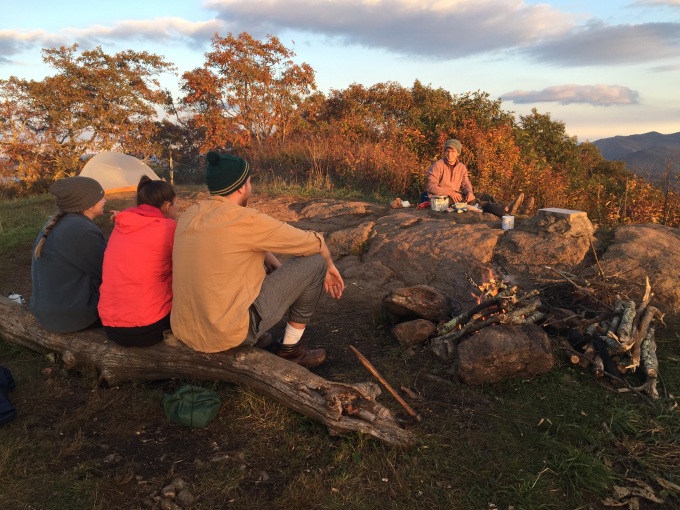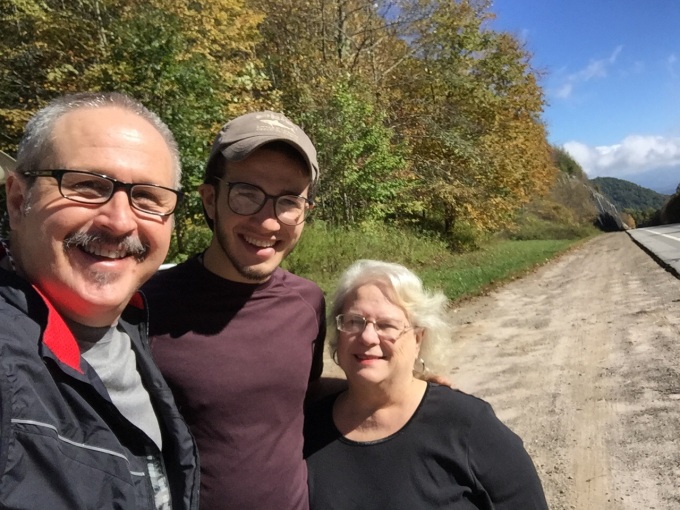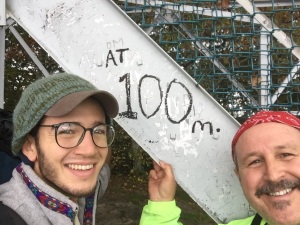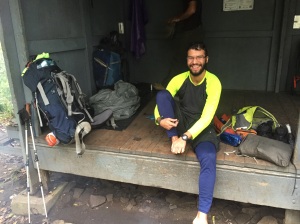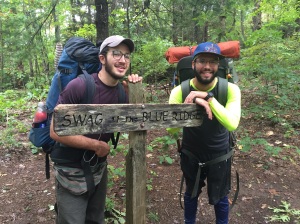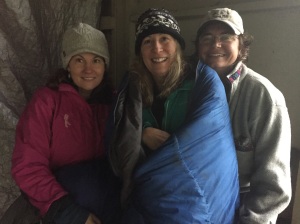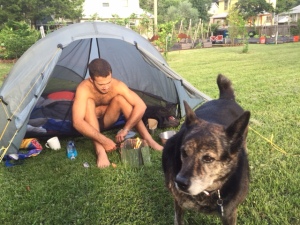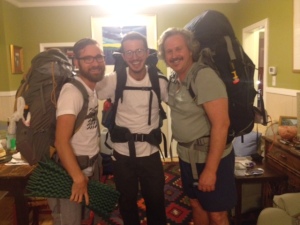In “The End of the Trail, Part 1,” I recounted the tale of what was meant to be the last morning of our Appalachian Trail journey. Alexander and I had spent the previous night with our friend Stuart, from Texas, at Brown Fork Gap Shelter. Stuart was a highly organized hiker, who liked to be on the trail at first light. His efficiency reawakened some misgivings I’d been harboring about my own competence as an outdoorsman. Luckily, Stuart’s generous nature and his willingness to share his trail knowledge helped me see that my shortcomings as a hiker were simply OK in the grand scheme of things. No matter that other hikers might be more adventurous, more experienced, or, like Stuart, more efficient. I am the man I am. No need to compare myself to anyone.
That morning, after Stuart left the shelter, I sat sipping coffee, awaiting Alexander’s awakening, the day dawning all around me. There is something magical about the forest when the sun makes its first appearance through the trees. And once Alexander awoke, we allowed ourselves to soak in all its wonder. We talked, we watched the morning develop, and we began to mourn, each in our own way, the ending of our time on the AT.
So it was that, later that day, over lunch, we made the choice to linger one more night in the forest. After checking our navigation app, we discovered there was another shelter located less than three miles ahead—four miles shy of our final destination at Fontana Dam. That small decision—to spend one more night on the AT—opened a doorway onto one of the most unusual encounters of our entire journey.
* * * *
We arrive at Cable Gap shelter a few minutes after 3:00 pm. About an hour later, we are joined by Stephen, a fireman from Asheville, North Carolina. Stephen is drenched in sweat and appears to have been running a race. Before he says “Hello,” or removes his pack, or even asks our names, Stephen barks out, “Are you guys sleeping in the shelter, or what?” By this point, Alexander and I have unpacked, inflated our pads, unrolled our sleeping bags, and arranged our gear neatly in the shelter. In a word, it is obvious that we have settled into the shelter for the night.
I think to myself, “This guy could really get under my nerves.” But to be fair, he just hiked fifteen miles in four hours and forty-seven minutes. (Stephen informed us straight off of his astounding pace—a bona fide hiking miracle. Or so he claimed.) “Maybe,” I think, “just maybe, he’s tired, and after all that zooming through the forest his blood sugar is low. It could happen to anyone. Right?” So I decide to give Stephen a break.
It turns out I was wrong.
An hour rolls by, and even though he has eaten a Clif Bar or two, he is still pissing me off with his tales of personal accomplishments. Finally, he asks how far we traveled before arriving at the shelter. But our six-mile day is not up to Stephen’s rigorous AT mileage standards. “You guys are sure taking your sweet time hiking,” he quips. Thankfully, my early morning revelation to relinquish all comparisons with other hikers has already brought me a measured peace.
However, even for a man basking in the afterglow of inner stillness, there is no effective way of communicating with a guy like this. There is only listening to his one-broadcast programming: The Stephen Show.
So I am sitting here wondering who this guy really is—and what he’s doing in our camp. Then I remember. Oh, yeah. It’s the People’s Trail. And I remind myself to be patient. That everyone has a right to be here. “Just sit with it a while longer, sport,” I tell myself. “Let’s see how far this peacock can take this crap.” But then there is that other part of my brain that can’t believe someone can actually behave like this for more than five minutes. Stephen has been going on for so long, I am looking up and down the trail, expecting Alan Funt to step out from behind a tree in a cheap bear suit and welcome Alexander and me to Candid Camera.
Stephen doesn’t sense any animosity from us, but I can’t believe he sees us as his willing audience, either. Then a wayward thought creeps into my mind. Maybe Stephen is at peace with himself, too. Just the idea of that is a bit frightening, so I slough if off, and consider the other—and more likely—possibility: Stephen is just a self-absorbed idiot.
Of course, we can all be idiots. Myself included. But I get the sense that Stephen is routinely oblivious to the effect he has on people. And right now, he is on a roll, so he just leans into his self-inflated view of the world, and, for the next twenty minutes, recites details of all the cool hiking trips he has made on the AT—despite the bumbling ineptitude of the fools who have traveled with him. It is at this point that we discover Stephen has left his two current hiking buddies behind hours ago. When I ask why he would leave the company of friends to hike alone, Stephen informs me he is simply too fast a hiker. “Most people do between one to two miles an hour on the trail. Me, I do like twice that. Maybe more,” he boasts.
Inner stillness or not, this guy is standing on my last nerve. My skin hurts just listening to him, but I smile and probe a bit, searching for signs that he has a heartbeat and may, in fact, be human. Instead, I learn that he has all the best gear, packs light, knows all the trails, doesn’t even need a map, and has been climbing every rock in this forest like a mountain goat since he was ten years old.
About then, Alexander leans way over onto his right butt cheek, leaving a gap of about six inches between his left butt cheek and the log he’s sitting on and mimes sticking something up his rear end. This, of course, is the universal sign for “This guy really has a stick up his butt.” Alexander and I both grin—and turn our attention back to the evening’s entertainment: more of Stephen’s amazing tales of Stephen.
It’s going on 6:00 pm, by now, and Stephen has been flat out for more than two hours. A part of me is impressed that he can keep his monologue on target for that long. Another part of me notices that, while he’s been talking, Stephen has also been keeping an eye on Alexander, as he builds one of his most excellent fires. I know Stephen doesn’t focus his attention on anyone that long unless he can find fault. Now, he continues to stare at Alexander, looking for some sign that Alexander is building his fire all wrong. Which would lead Stephen right into his next bit, “How a Proper Fire Should Actually Be Constructed.” God help us.
But Alexander is a fire-making master, and I can tell Stephen is growing frustrated because my son hasn’t made a slip.
As I watch, Alexander constructs his fire like an origami master folds a single sheet of paper into a weeping swan. He gives such delicate attention to every detail—to how and where he arranges each of the small bits of wood that make up the tight assemblage of sticks—that I can see Alexander has inherited my father’s penchant for engineering. I wonder, what is he thinking as he focuses on the structure before him? Obviously, he is weighing the practical questions: Which sticks are the driest? Which will catch fire quickest? Which will support the weight of the next? But to my eye, the whole affair goes way beyond the ordering of sticks and twigs. I get the sense that at the crux of Alexander’s fire-making initiative is the fact that he is an artist. A sculptor and fine blacksmith in his professional life, he approaches each fire as if it were an artistic creation.
But I sense something else, as well.
This hike has become a spiritual pursuit for each of us. Of course, we are here to spend time together—to enjoy each other’s company and cement the bonds between father and son. But we are also individuals, and we have our individual reasons for being here.
For myself, I am seeking to quicken those aspects of my mind and body that have become fallow. In negotiating the circuitous path of the Appalachian Trail, I have hoped to also uncover a new and more sympathetic path for my daily life back home. In that quest, I have been helped by the peace we’ve found in the forest, by the grueling intensity of the physical exertion, and by the “allies” I have met—the owl, the snake, and certain of the plants I have discovered. Like Native American cultures teach, these allies of the natural world have offered me assistance and allowed me to draw strength from them.
And for Alexander? While I cannot begin to assume his deeper purposes for this journey, what I can say is this: It appears he has discovered fire to be one of his allies. I believe he creates fire with a spiritual intent, and that is why he takes such time, gives such focus, such meticulous care to its preparation. It is my considered opinion that when Alexander sees a circle of rocks in the woods, he does not interpret them as a simple hearth for the purpose of providing us with warmth for the evening or heat for cooking. Rather, he sees them as an altar—a place where he may practice his own understanding.
Now, sitting on my log, about three feet from where Alexander is creating this evening’s fire, I have a commanding view of the cross section of his intricately layered twig pyramid, and I wonder quite seriously if he was in fact Archimedes or Michelangelo in a previous lifetime.
I glance over at Stephen. He is still watching Alexander at work. It’s impossible not to. But Stephen won’t allow himself the luxury of being a voyeur, of staring avidly, of gawking in outright ecstasy at the beauty of Alexander’s creation. Instead, he watches covertly, from the corner of his eye, only stealing longer glances when he thinks I am not looking.
The fire is lit now and is warming each of us. Whether we like it or not, Stephen has entered our sacred space. Alexander and I have become accustomed to being in this space, the four-foot radius that emanates from the center of the flames. We are familiar with the level of silent communication that takes place here. And, as always, Alexander’s fire radiates warmth, but it also radiates his love for our journey. Stephen is an outsider. An uninvited and uninitiated guest. I can feel his discomfort in our presence.
I see an itch start to form at the corner of Stephen’s eye, and his hands dig way down into his shorts, and then his fingers begin picking nervously at something in his pockets, or maybe just at the hair on his legs. I sense the pressure building in him as clearly as if he were blowing up a tightly stretched balloon that is about to pop. He starts grinding his teeth, and I realize it’s because he can’t find a way in. I believe Stephen can sense how Alexander and I feel inside our circle. The love we have for one another is very present, and I think it pushes him hard. I think he understands that Alexander is up to something more than just building a fire, and Stephen’s uncertainty of what that “something” might be troubles him. I wonder how insecure and unsettled he must be in the presence of such subtle and genuine feelings. So he does the only thing a guy like Stephen can do—he turns his back on us. But then he does something strange. Back still turned, he scooches a little closer to the flames. Is he just trying to keep warm? Or is he trying to stay connected to our circle?
That scooch is the only sign of concession he makes. No kudos to Alexander for his incredible fire-building exhibition. No “thank you” for the raging fire that now warms his backside. Then, without missing a beat, Stephen continues his litany of woodsman accomplishments—now talking with his back to us. There is a different inflection to his voice, however, and his words spill out faster and with less certainty than they did before. I can tell he is nervous. Alexander recognizes it, too, and looks over at me, making a face that says, “What’s up with him?” I shrug in reply, although some things seem to be coming into focus.
Next, Stephen stands and moves to the far side of the ring of stones that surround the dance of flames, but he continues talking, addressing an invisible audience, located, I presume somewhere on the other side of the small stream at the bottom of the short ravine. The scene is surreal. But as I gaze across at him—at the back of him—I no longer view him as the pain in the ass we have been dealing with for hours, but as a pitiful character, one who strikes me as both lonely and afraid. Yes, he is still acting like an idiot. Yes, he is still standing on my last nerve. But for some inexplicable reason I am seeing him differently. Is it the obtuseness of a man addressing us, while looking in the opposite direction? Or is it the dark hilarity of his invisible audience?
Whatever the case, I now realize that his feeble attempts to communicate are an effort to save face. A few short hours ago, this obnoxious character entered our camp with all of the finesse of a German tank rolling down a cobblestone street in a small village in France. Now, all I can see is a little boy who has been placed in time out. I no longer hear his whining drivel. Instead, I hear a cry for help.
Suddenly, Stephen does an about-face. He seats himself back at Alexander’s fire, looks me dead in the eye, and begins to talk about his wife and his three sons. This is the first time since his arrival that Stephen has spoken about someone other than himself. Alexander and I share a questioning glance. Were the last two hours just foreplay?
Then, Stephen’s entire demeanor changes. It is as if someone sunk a heroine syringe deep into a main artery and drove the plunger home. Tears well in his eyes, but he holds them at bay—small pools perched on his lower eyelids. He tilts his head back to keep the tiny pools from running down his face. Finally, he lifts a hand to wipe his tears away.
To be continued.
